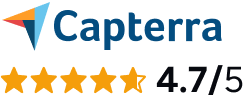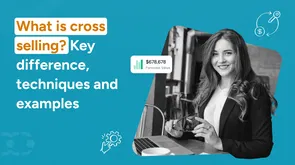According to a study, 67% of sales are lost because reps are not effectively qualifying leads. So, to save you from this fiasco, implement a sales qualification framework in your business.
This will ensure that your sales team only works on the most qualified prospects.
A sales qualification framework can:
- Improve your sales team productivity
- Save your rep’s time and energy
- Save your money
- Boost conversion rates
To improve your sales qualification process, you must consider these lead qualification frameworks.
Learn the six best sales qualification frameworks and find the best one for your industry in one article.
Let’s get started with the simple definition.
What is sales qualification framework?
The sales qualification framework is a set of predefined criteria that one can implement to qualify leads.
The qualification framework helps you identify the characteristics of the lead and match them with your ideal customer profile.
It is a major part of your sales qualification process. This helps you figure out what can be the ideal sales qualifying questions for an effective sales conversation.
To close more deals, you need to discover that your ideal prospects are more likely to become buyers.
But the concern is how quickly you can identify your opportunities when dealing with dozens of profiles.
Among those generated lists of leads, some can be marketing-qualified leads; some can be sales-qualified leads. Also, there might be unqualified ones.
See the image below to understand how a sales qualification framework is a game changer for sales teams!
Finding high-quality prospects takes time and effort, and you achieve it with two smart weapons of success: a lead scoring software and a sales qualification framework.
A lead scoring software is a lead qualification tool. It will automatically prioritize leads based on their interests and engagement with your brand, helping you identify relevant leads.
The sales qualification framework will assist you in your sales process, from smart prospecting to deal closing.
Moving on to the 6 best lead qualification frameworks for sales professionals.
6 Best sales qualification frameworks you can choose from
Every sales rep uses a certain lead qualifying framework to define the likelihood of a lead turning into a paying customer.
Here are the 6 best lead qualification frameworks that you can choose from:
1. BANT
BANT is a long-established framework to qualify sales leads. It was developed in the 1950s by IBM.
It emphasizes the budget of the lead. Can the lead purchase your product or service?
Budget is considered a critical sales qualification criterion, as the lead must have a budget that matches your solution.
Next, it focuses on whether the lead has the authority to make purchasing decisions.
This is followed by understanding the prospect’s problem, making it easier for the sales rep to pitch the required solution and create a great impact.
This framework enables sales reps to qualify leads during initial calls instead of spending days or weeks. Lastly, it focuses on the urgency of the lead’s purchase.
Let’s look at the pros and cons of this framework.
Pros:
- It saves time in the qualification process.
- Using the BANT framework ensures a short sales cycle.
- It is flexible and reliable.
Cons:
- It is a seller-focused approach, which can sometimes irritate customers.
- This isn’t the fastest framework to implement.
2. ANUM
It’s the modern version of the BANT framework developed by Ken Krogue.
The ANUM framework takes a customer-centric approach. It focuses on the rep getting in touch with the concerned person, saving time for both parties.
With ANUM, sales reps ensure that the lead is the decision-maker before taking the discussion ahead.
It then guides reps to focus on the lead’s problem and offer a solution.
Further, the framework emphasizes understanding the urgency of implementing the solution from the prospect’s perspective.
Lastly, it evaluates the budget range to determine the lead’s eligibility for your offered service.
Let’s look at the pros and cons of the ANUM framework.
Pros:
- It saves time for the reps by ensuring they contact the decision-maker.
- It clarifies which potential leads can be moved further down the process.
Cons:
- It qualifies leads based on decision-making power, meaning gatekeepers might be disqualified. However, they can often lead to the right person.
3. MEDDIC
The MEDDIC framework was developed during the 1990s by Jack Napoli and Dick Dunkel. This framework primarily focuses on understanding your prospect in depth.
This framework considers various aspects of the lead during the qualification process. It begins with identifying the measurable value your solution provides to the prospects.
Next, it focuses on determining whether you are communicating with the economic buyer—the individual responsible for making the buying decision—and understanding the factors influencing their decision-making process.
It also involves identifying pain points to make your pitch more effective. Lastly, this framework highlights the importance of a “sales champion.”
The sales champion is a person within the client’s organization who assists in the sales process. They help by keeping you informed about decision-making steps and providing insights that can help close the deal.
Let’s review the pros and cons of this framework.
Pros:
- This framework helps you accurately qualify leads.
- Using this framework results in fewer deal failures.
Cons:
- This framework involves a lengthy lead qualification process.
- Extensive tracking and recording of data are required.
4. CHAMP
The CHAMP framework focuses more on solving the lead’s problem and prioritizes the challenges faced by the prospect.
This framework is customer-centric. It begins with understanding the lead’s problem and focuses on providing an adequate solution. Next, it evaluates the authority of the lead in terms of decision-making power.
It further assesses the budget proposition of the lead. Lastly, it checks whether the solution is a priority for the lead or not.
This is how you can qualify leads using the CHAMP framework. Below are some pros and cons of using the CHAMP framework.
Pros:
- This framework helps to understand the prospect better as the problem is identified upfront.
- It simplifies the process of disqualifying leads.
Cons:
- This framework can lead to a delayed sales cycle.
- It lacks coverage of other important aspects like decision criteria and the decision-making process, which may cause challenges later in the process.
5. FAINT
Mike Schultz developed the FAINT framework. It stands out from other frameworks by considering the interest factor of the lead.
It solely focuses on the product or service as a key factor in the buying decision.
This framework targets prospects who make unplanned purchases, acknowledging the significant volume of sudden buyer categories.
The FAINT framework qualifies leads by prioritizing their monetary capability.
It then assesses the decision-making capability of the lead.
Finally, it emphasizes efforts to create interest in the solution you’re offering, similar to building curiosity about your product or service.
This is how you can use the FAINT framework. Here are some pros and cons of this framework:
Pros:
- It enables faster conversion of leads into prospects.
- It allows effective utilization of resources and time.
Cons:
- If the product or service doesn’t solve the lead’s problem, creating interest around it may not succeed.
- Leads with limited funds might be lost, even if your solution is the best fit for their problem.
6. GPCTBA and C&I
It is a B2B-centered qualification framework designed to align the company’s and lead’s goals, resulting in fruitful engagement.
This framework assumes that the prospect is already familiar with your products and services and seeks more than just a basic introduction.
The framework qualifies leads by considering multiple aspects:
- Starts with understanding the prospect’s goals and plans.
- Focuses on providing solutions to the challenges faced by the prospect.
- Assesses the timeline for implementing the solution.
- Considers their budget bracket and authority to make decisions.
- Analyzes both the positive implications and potential negative aspects of the deal.
This point makes the GPCTBA and C&I framework stand out from other sales qualification frameworks.
Understanding your prospect’s business model, buying process, goals, and challenges is essential to persuade them to convert.
Let’s now explore the pros and cons of this framework.
Pros:
- This framework ensures you move ahead with leads that have the highest probability of deal closures.
Cons:
- It involves a lengthy sales qualification process and can be time-consuming.
Each sales qualification framework comes with its unique approach.
However, auditing the efficacy of your sales qualification framework is one of the common concerns for sales leaders. Worry not!
A Sales Goal Tracking software can help you monitor your sales deals by providing insights into conversion rates, team efforts, and key performance indicators.
Track your sales goals to achieve your sales success!
Our sales goal-tracking software makes it easy to set, track, and achieve your sales targets. Start seeing results now.
Which framework is suitable for your industry?
After learning about the frameworks above, you might feel unsure about which one to adopt.
Here’s a table to simplify your decision-making process:
| Sales Qualification Framework | When to Use It? | Which Type of Businesses It Suits Well? |
|---|
| BANT | When a lead has a specific budget and you want to invest efforts and time. Ideal for organizations with high-deal values. | Software and IT companies |
| ANUM | When the client has a long and complicated decision-making process. Best for large-sized companies. | All types of industries |
| MEDDIC | Helpful with long sales cycles, e.g., launching new software or selling a new version of a solution. | SaaS and other online industries |
| CHAMP | When you want to focus on understanding your target audience in the long run. | Startups and SaaS |
| FAINT | When the lead has substantial funds and makes unplanned purchases. Ideal for industries with unplanned buyers. | eCommerce and other online industries |
| GPCTBA & CI | When you have enough time to understand prospects' needs and goals. | Startups, small, and mid-sized businesses across any industry |
Conclusion
A sales qualification framework is a predefined set of criteria that simplifies your lead qualification process.
These frameworks help qualify leads to progress further in the sales pipeline, using tailored qualification questions.
However, businesses with different products or services should have a deep understanding of how to leverage these frameworks to improve sales conversions.
Additionally, a CRM can serve as a consistent support system, managing numerous leads efficiently and helping your business grow seamlessly.
Salesmate CRM can help you grow, serving 5000+ teams!
Discover roadblocks, forecast deals and track everyday sales activities to get your business to grow faster.
Frequently asked questions
1. What is a sales qualification?
Sales qualification is a way to determine whether the prospect is a good fit for your brand. Here, your sales reps discover whether the lead is sales-worthy through various sales qualification questions.
2. Why is sales qualification important?
Sales qualification is important as it enables you to identify the potential customer and discover their challenges, pain points and desires associated with your brand. In a summarized way, sales qualification can help you understand your prospect better for personalized selling.







Key takeaways
According to a study, 67% of sales are lost because reps are not effectively qualifying leads. So, to save you from this fiasco, implement a sales qualification framework in your business.
This will ensure that your sales team only works on the most qualified prospects.
A sales qualification framework can:
To improve your sales qualification process, you must consider these lead qualification frameworks.
Learn the six best sales qualification frameworks and find the best one for your industry in one article.
Let’s get started with the simple definition.
What is sales qualification framework?
The sales qualification framework is a set of predefined criteria that one can implement to qualify leads.
The qualification framework helps you identify the characteristics of the lead and match them with your ideal customer profile.
It is a major part of your sales qualification process. This helps you figure out what can be the ideal sales qualifying questions for an effective sales conversation.
To close more deals, you need to discover that your ideal prospects are more likely to become buyers.
But the concern is how quickly you can identify your opportunities when dealing with dozens of profiles.
Among those generated lists of leads, some can be marketing-qualified leads; some can be sales-qualified leads. Also, there might be unqualified ones.
See the image below to understand how a sales qualification framework is a game changer for sales teams!
Finding high-quality prospects takes time and effort, and you achieve it with two smart weapons of success: a lead scoring software and a sales qualification framework.
A lead scoring software is a lead qualification tool. It will automatically prioritize leads based on their interests and engagement with your brand, helping you identify relevant leads.
The sales qualification framework will assist you in your sales process, from smart prospecting to deal closing.
Moving on to the 6 best lead qualification frameworks for sales professionals.
6 Best sales qualification frameworks you can choose from
Every sales rep uses a certain lead qualifying framework to define the likelihood of a lead turning into a paying customer.
Here are the 6 best lead qualification frameworks that you can choose from:
1. BANT
BANT is a long-established framework to qualify sales leads. It was developed in the 1950s by IBM.
It emphasizes the budget of the lead. Can the lead purchase your product or service?
Budget is considered a critical sales qualification criterion, as the lead must have a budget that matches your solution.
Next, it focuses on whether the lead has the authority to make purchasing decisions.
This is followed by understanding the prospect’s problem, making it easier for the sales rep to pitch the required solution and create a great impact.
This framework enables sales reps to qualify leads during initial calls instead of spending days or weeks. Lastly, it focuses on the urgency of the lead’s purchase.
Let’s look at the pros and cons of this framework.
Pros:
Cons:
2. ANUM
It’s the modern version of the BANT framework developed by Ken Krogue.
The ANUM framework takes a customer-centric approach. It focuses on the rep getting in touch with the concerned person, saving time for both parties.
With ANUM, sales reps ensure that the lead is the decision-maker before taking the discussion ahead.
It then guides reps to focus on the lead’s problem and offer a solution.
Further, the framework emphasizes understanding the urgency of implementing the solution from the prospect’s perspective.
Lastly, it evaluates the budget range to determine the lead’s eligibility for your offered service.
Let’s look at the pros and cons of the ANUM framework.
Pros:
Cons:
3. MEDDIC
The MEDDIC framework was developed during the 1990s by Jack Napoli and Dick Dunkel. This framework primarily focuses on understanding your prospect in depth.
This framework considers various aspects of the lead during the qualification process. It begins with identifying the measurable value your solution provides to the prospects.
Next, it focuses on determining whether you are communicating with the economic buyer—the individual responsible for making the buying decision—and understanding the factors influencing their decision-making process.
It also involves identifying pain points to make your pitch more effective. Lastly, this framework highlights the importance of a “sales champion.”
The sales champion is a person within the client’s organization who assists in the sales process. They help by keeping you informed about decision-making steps and providing insights that can help close the deal.
Let’s review the pros and cons of this framework.
Pros:
Cons:
4. CHAMP
The CHAMP framework focuses more on solving the lead’s problem and prioritizes the challenges faced by the prospect.
This framework is customer-centric. It begins with understanding the lead’s problem and focuses on providing an adequate solution. Next, it evaluates the authority of the lead in terms of decision-making power.
It further assesses the budget proposition of the lead. Lastly, it checks whether the solution is a priority for the lead or not.
This is how you can qualify leads using the CHAMP framework. Below are some pros and cons of using the CHAMP framework.
Pros:
Cons:
5. FAINT
Mike Schultz developed the FAINT framework. It stands out from other frameworks by considering the interest factor of the lead.
It solely focuses on the product or service as a key factor in the buying decision.
This framework targets prospects who make unplanned purchases, acknowledging the significant volume of sudden buyer categories.
The FAINT framework qualifies leads by prioritizing their monetary capability.
It then assesses the decision-making capability of the lead.
Finally, it emphasizes efforts to create interest in the solution you’re offering, similar to building curiosity about your product or service.
This is how you can use the FAINT framework. Here are some pros and cons of this framework:
Pros:
Cons:
6. GPCTBA and C&I
It is a B2B-centered qualification framework designed to align the company’s and lead’s goals, resulting in fruitful engagement.
This framework assumes that the prospect is already familiar with your products and services and seeks more than just a basic introduction.
The framework qualifies leads by considering multiple aspects:
This point makes the GPCTBA and C&I framework stand out from other sales qualification frameworks.
Understanding your prospect’s business model, buying process, goals, and challenges is essential to persuade them to convert.
Let’s now explore the pros and cons of this framework.
Pros:
Cons:
Each sales qualification framework comes with its unique approach.
However, auditing the efficacy of your sales qualification framework is one of the common concerns for sales leaders. Worry not!
A Sales Goal Tracking software can help you monitor your sales deals by providing insights into conversion rates, team efforts, and key performance indicators.
Track your sales goals to achieve your sales success!
Our sales goal-tracking software makes it easy to set, track, and achieve your sales targets. Start seeing results now.
Which framework is suitable for your industry?
After learning about the frameworks above, you might feel unsure about which one to adopt.
Here’s a table to simplify your decision-making process:
Conclusion
A sales qualification framework is a predefined set of criteria that simplifies your lead qualification process.
These frameworks help qualify leads to progress further in the sales pipeline, using tailored qualification questions.
However, businesses with different products or services should have a deep understanding of how to leverage these frameworks to improve sales conversions.
Additionally, a CRM can serve as a consistent support system, managing numerous leads efficiently and helping your business grow seamlessly.
Salesmate CRM can help you grow, serving 5000+ teams!
Discover roadblocks, forecast deals and track everyday sales activities to get your business to grow faster.
Frequently asked questions
1. What is a sales qualification?
Sales qualification is a way to determine whether the prospect is a good fit for your brand. Here, your sales reps discover whether the lead is sales-worthy through various sales qualification questions.
2. Why is sales qualification important?
Sales qualification is important as it enables you to identify the potential customer and discover their challenges, pain points and desires associated with your brand. In a summarized way, sales qualification can help you understand your prospect better for personalized selling.
Sonali Negi
Content WriterSonali is a writer born out of her utmost passion for writing. She is working with a passionate team of content creators at Salesmate. She enjoys learning about new ideas in marketing and sales. She is an optimistic girl and endeavors to bring the best out of every situation. In her free time, she loves to introspect and observe people.